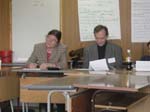Visions of freedom in the Balkan concept of the world are significant, but not a studied topic. Without understanding the sensitivity towards rebellion for freedom, rejection of oppression, freedom and surveillance, personal and collective freedoms, political uses of the idea of freedom, the Balkan everyday and culture could not be analyzed. Different understandings of freedom have often been a source of confrontation in the Balkan past, and in some cases today as well. Being aware of the significance of the topic we offer some of its aspects for discussion:
- Talking about freedom. Who, when and where started talking about the Balkans?
- Ethic and aesthetic paradigms of freedom.
- Canonical and noncanonical, “pure” and “ ideological” art.
- Rebels and censors. Freedom of thought and censored thought.
- Space and time of freedom and non-freedom.
- Supervision of freedom. Limits of supervision. Forms of supervision. Policies of supervision. Disciplinary regimes.
- Free choice. Sin. Crime. Religious notions of freedom.
- Collective and individual freedoms.
- Generations and gender in pursuit of autonomy. Personal freedom and individualization – post modernistic dimensions.
- Language supervision. Standardization of language choice.
- The idea of freedom and its ideological and power uses.
- “My free choice is not a threat to your freedom” – situation practices of the vision of freedom.
- Personal experience of freedom. Freedom and loneliness.
In 2009 it will be 170 years since the death of Yuri Venelin. To mark this anniversary, we are planning a thematic section dedicated to the Venelin’s life and work. The section will be conducted within the framework of the 18th Round Table.











